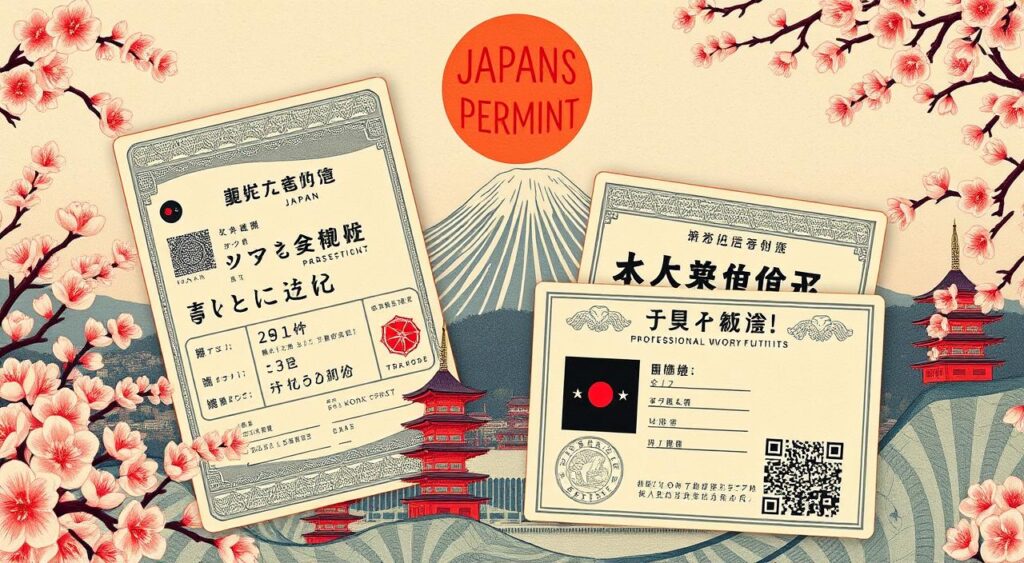
Japan is becoming a top choice for professionals looking for international jobs. The country’s economy is growing, and it needs skilled workers from around the world. This means there are many job opportunities for those ready to work in Japan.
Finding a job in Japan with visa sponsorship can be a great chance to experience the culture. You’ll get to learn about Japan’s traditions while growing your career. Working here also offers good pay and personal growth, making it a great choice for career seekers.
Key Takeaways
- Japan’s growing demand for skilled foreign workers creates abundant employment opportunities
- Securing a job with visa sponsorship offers a unique cultural experience and professional development
- Competitive salaries and unparalleled personal growth are key benefits of working in Japan
- Navigating the visa application process is essential for a successful career move to Japan
- Understanding the various work visa types and eligibility criteria is crucial for prospective applicants
Understanding Visa Sponsorship Requirements in Japan
Getting a grip on Japanese work permits and visa types can be tough for foreign workers. But knowing what you need to work in Japan is key. It’s important for those looking to find jobs in this beautiful country.
Types of Work Visas Available
Japan has many work visa options. You can apply for the Highly Skilled Professional visa or the Specified Skilled Worker visa. Each visa has its own rules and perks, fitting different international professionals’ needs.
Eligibility Criteria for Foreign Workers
- Educational qualifications: You might need a bachelor’s degree or more, depending on the visa.
- Work experience: Most visas require experience in a specific field.
- Language proficiency: Knowing Japanese or English, or both, is usually needed.
Duration and Renewal Process
Work visas in Japan can last from one to five years. To renew, you must show you’re still working, meet income standards, and have a valid residence permit.
| Visa Category | Initial Duration | Renewal Eligibility |
|---|---|---|
| Highly Skilled Professional | 5 years | Continued employment, income threshold |
| Specified Skilled Worker | 1-5 years | Demonstrated skills, ongoing employment |
Understanding visa rules in Japan is crucial for foreign workers. Knowing the visa types, what you need, and how to renew helps you fit into Japan’s job market.

Popular Industries Offering Jobs in Japan with Visa Sponsorship
Japan’s job market is full of chances for foreign workers who need visa sponsorship. Many industries in Japan welcome international talent. They also help with getting work visas.
The tech industry is a big draw for IT jobs in Japan. Companies like Sony, Fujitsu, and NTT Data are known for their diverse teams. They often sponsor visas for skilled tech workers.
The education sector, especially for English teaching positions, is also a key area. Schools and universities in Japan look for foreign teachers. This is because there’s a big need for English language instruction.
Engineering jobs in Japan are another great option for visa sponsorship. Big companies like Toyota, Mitsubishi, and Hitachi hire international engineers. They work in many fields, from mechanical to electrical engineering.
The hospitality industry in Japan also offers visa sponsorship. Hotels, restaurants, and tourism businesses often hire. They need staff for the front desk, kitchens, and customer service.
| Industry | Examples of Companies Offering Visa Sponsorship |
|---|---|
| IT | Sony, Fujitsu, NTT Data |
| Education (English Teaching) | Language schools, international universities, public schools |
| Engineering | Toyota, Mitsubishi, Hitachi |
| Hospitality | Hotels, restaurants, tourism-related businesses |
These are just a few examples of popular industries in Japan that offer jobs with visa sponsorship. Knowing what these sectors need can help foreign job seekers find good opportunities in Japan.

Essential Skills and Qualifications for Japanese Work Visas
To get a work visa in Japan, you need to show certain skills and qualifications. Knowing Japanese is very important. While English might work in some jobs, speaking Japanese well can really help you get a visa.
Language Requirements
The Japanese Language Proficiency Test (JLPT) shows how well you speak Japanese. Employers might ask for different JLPT levels, from N5 to N1. Some jobs might accept English skills, but speaking Japanese and English is best.
Educational Background
Having the right education is also key for a work visa in Japan. Many jobs need a bachelor’s degree or more. The education needed can change based on the job, but a good degree helps a lot.
Professional Experience Expectations
Employers in Japan want people with work experience, especially in the job they’re hiring for. The amount of experience needed varies. Showing you have relevant experience, in Japan or elsewhere, can help a lot.
Meeting these language, education, and experience needs can make you more likely to get a work visa. This opens the door to a great career in Japan.
Jobs in Japan offers Visa Sponsorship
Finding a job in Japan that offers visa sponsorship can open up a world of opportunities for international talent. There are several resources to help with this process. These include job search websites, recruitment agencies, and direct company applications.
Job search platforms like GaijinPot and Daijob are made for foreigners looking for jobs in Japan. They offer a selection of job listings that include visa sponsorship. This makes it easier for international candidates to find jobs.
Recruitment agencies that focus on placing overseas professionals in Japan are also helpful. They have connections with companies that sponsor work visas. This means they can find job openings that match your skills.
- Networking, both online and offline, can be a powerful tool for uncovering job opportunities in Japan that offer visa sponsorship. Connecting with industry professionals, attending networking events, and leveraging social media platforms like LinkedIn can help you tap into the hidden job market.
- When applying directly to companies, research their track record of sponsoring foreign workers and highlight your relevant skills and qualifications in your application. Many leading Japanese organizations are eager to attract global talent and may be willing to sponsor the necessary work visas.
By using job search websites, recruitment agencies, and networking strategies, you can increase your chances of finding a fulfilling career in Japan with visa sponsorship.
Conclusion
Japan is a great place for international talent looking for visa sponsorship. The job market in Tokyo and Kyoto is open to global professionals. By knowing the visa rules and finding the right job, you can start a fulfilling life in Japan.
Working in Japan means diving into a rich culture and growing your career. You can work in tech, traditional crafts, or the service sector. Japan is ready for you to join and grow.
Starting your job search in Japan needs careful planning. Look into companies, make your application stand out, and get ready for visa paperwork. With hard work and the right attitude, you can find great opportunities in Japan.
FAQ
What types of work visas are available in Japan for foreign workers?
Japan has several work visas. These include the Highly Skilled Professional visa and the Specified Skilled Worker visa. There are also industry-specific visas for education, engineering, and IT.
What are the eligibility criteria for obtaining a work visa in Japan?
To get a work visa, you need a relevant education and professional experience. You also need to pass the Japanese Language Proficiency Test (JLPT) in some cases.
Which industries in Japan frequently offer job opportunities with visa sponsorship?
Jobs in IT, education, engineering, manufacturing, and hospitality often come with visa sponsorship. These sectors actively seek foreign workers.
How can I find job openings in Japan that offer visa sponsorship?
Look for jobs on websites like GaijinPot and Daijob. Networking online and offline helps too. Contacting companies that sponsor visas is also a good strategy.
What are the typical language requirements for working in Japan with a sponsored visa?
Language needs vary by job and industry. Japanese skills, shown by JLPT, are often preferred. But, English is enough in IT or international companies.
How long do work visas in Japan typically last, and what is the renewal process?
Work visas in Japan last from months to years, based on the visa and job. Renewal means updating documents and meeting new eligibility criteria.






